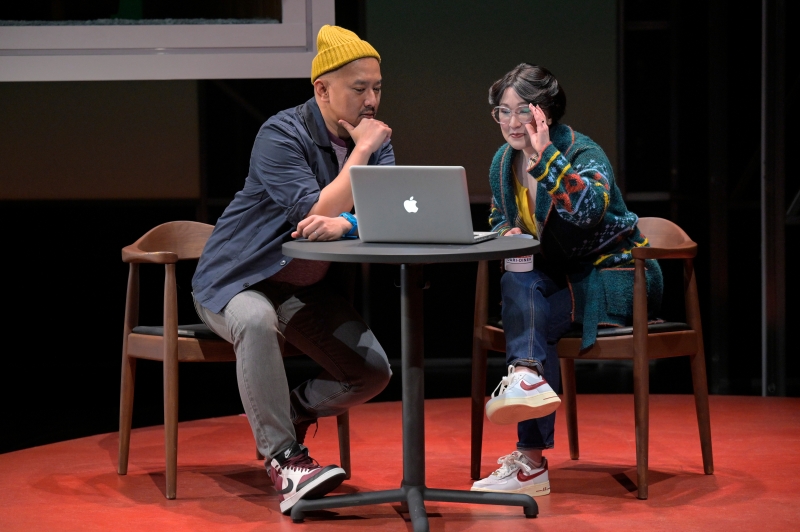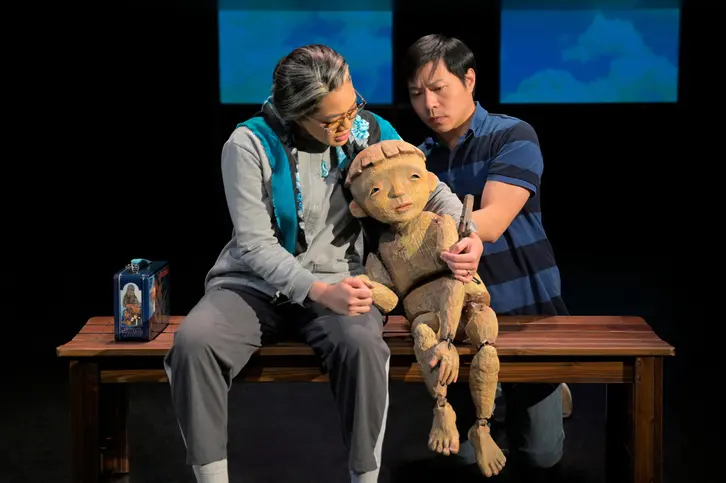
Qui Nguyen’s “Vietgone” was a huge hit at A.C.T.’s Strand Theatre five years ago. Drawing on the playwright’s own family history, it explored the cultural uprooting and U.S. resettlement of Vietnamese refugees during the 1970s through raucous comedy booby-trapped with moments of deep emotion.
“Poor Yella Rednecks: Vietgone 2,” now playing on that same stage, is, as its title indicates, a specimen of an extraordinarily rare thing: A theater sequel.
Within a genus marked by very little genius—the most notable English language exception being Eugene O’Neill’s a “Moon for The Misbegotten”—and too many sloppy singing seconds— “Annie Warbucks,” “Bring Back Birdie,” “Love Never Dies” (i.e. Phantom of the Opera, Part Deux), “Poor Yella Rednecks” is a resounding success.
Considered on a broader scale, it’s still a success, but a qualified one.
The most obvious analog to Nguyen’s planned trio of “Vietgone” plays is Neil Simon’s Eugene Trilogy: “Brighton Beach Memoirs,” “Biloxi Blues,” and “Broadway Bound.”
Both are narrated by aspiring writers who recount their families’ stories with humor, sentiment and an acute awareness of an ethnic minority’s conflicts with and attractions to mainstream American culture.
In “Poor Yella Rednecks,” as in the the first “Vietgone,” the proceedings are introduced and overseen by a Playwright character (Jomar Tagatac, who, like all of the cast, plays several small roles in addition to a primary part).
And once again, Vietnamese characters are centered. Even facing sometimes harrowing challenges (Far more difficult than those faced by Simon’s Jewish Jerome family), they’re never pitiable, never victims.
While Nguyen’s post-modern, pointedly self-conscious approach to narrative, full of funny stylistic lifts from all manner of popular culture is an obvious two generations removed from Simon’s more traditional approach, there’s a domestic focus and familiar sit-com rhythm underlying both.
Nguyen’s working class household humor suggests a lemongrass-scented “Roseanne,” and “Poor Yella Rednecks” is studded with Easter egg references to ‘70s comedies, most amusingly “Three’s Company.”
Memory as collage
After spending much of the first play in a federal resettlement camp, “Poor Yella Rednecks” finds the Playwright’s family having moved to a cramped apartment in El Dorado, Arkansas.
Young mother Tong (Jenny Nguyen Nelson, convincingly self-sufficient) is the breadwinner, waitressing at the local diner. Her husband, Quang (matinee handsome Hyunmin Rhee) remains clearly unsettled.
Their American-born son, the future Playwright, nicknamed Little Man, is oblivious to his family’s history, just a kid growing up and teased for being different by schoolyard bullies. (He’s played by Will Dao, deftly and expressively manipulating a large wooden puppet).
Tong’s mother, Tu (Christine Jamlig, with ace comic timing) provides laissez-fairechildcare and profanity-laced insults.
When cast members play the occasional white characters (and when their Vietnamese characters speak English), they employ Nguyen’s cleverest innovation, a sort-of pop pidgin language that reflects American culture of the era while making the speakers come off as buffoons:
“Fuck a duck, Starsky and Hutch!” yammer cops as they break up a fight. To “Hulk Hogan” is to beat up. “Cheeseburger” is a national character-defining gestalt.
Like its predecessor, “Poor Yella Rednecks”- also under the sprightly direction of Jaime Castañeda -zips through short, sharply drawn scenes with antic energy.
Unfortunately, in this go round, the kaleidoscopic velocity doesn’t give a pair of potentially wrenching plot twists the room they need to fully emotionally register with audiences. Some major substance gets overwhelmed by style.
Throughout the show, the influence of comic books, sit-coms, martial arts movies and hip-hop on Nguyen, born in 1976, comes through loud and clear.
In this context, the wooden Little Man feels oddly forced; while there’s a strong tradition of folkloric puppetry in Vietnam, our narrator would be much more familiar with Ernie, Bert and Cookie Monster.

Hamiltones
And the hip-hop influence is problematically overamplified. Several times throughout the show, the action’s momentum slows to a near freeze as characters step forward and deliver rap soliloquies to original music by Shammy Dee.
With repetitive lyrics and emotional content redundant of what’s already been delivered in dialogue, these interludes add little but drag to the proceedings.
A prominent lyrical quote from “Hamilton”: “Immigrants: We get the job done!” feels less like a tribute than a grab at the coat tails of a show that more effectively used rap music- and black performers -to make a powerful artistic and political statement.
No doubt rap had a significant place in the playlist of Nguyen’s teenage years, but the timeframes of neither the original “Vietgone” nor “Poor Yella Rednecks” have covered that period in the life of his fictional stand-in, Little Man.
Perhaps Nguyen’s planned third installment will get there, but for the moment, the musical numbers make neither aesthetic or intellectual sense.
The still-in-development VG3 also faces a storytelling problem which has already surfaced in this second chapter: The overarching structure of the Playwright narrator sharing tales from his family’s history is duplicated.
While the family stories move forward in time between parts one and two, the plays are individually bookended by the narrator introducing himself (while taking some crowdpleasing but egregious pot-shots at white theatergoers) and trying to explain his artistic motivation to a parent (His father in the first, his mother in the second).
Both plays conclude with earnest, sentimental and fundamentally similar expressions of the Playwright’s debt and devotion to family. That device may be comforting, but even this second iteration feels redundant.
As clever as Nguyen is at both mimicking and exploding sit-com conventions, the last thing one wants from him is a rerun.
